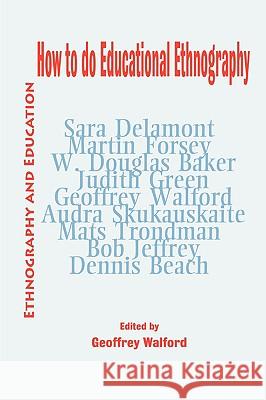How to do Educational Ethnography » książka
How to do Educational Ethnography
ISBN-13: 9781872767925 / Angielski / Miękka / 2008 / 196 str.
How to do Educational Ethnography
ISBN-13: 9781872767925 / Angielski / Miękka / 2008 / 196 str.
(netto: 93,82 VAT: 5%)
Najniższa cena z 30 dni: 97,43
ok. 16-18 dni roboczych.
Darmowa dostawa!
Following a brief introduction to the nature and history of ethnography, Walford considers questions of site selection, access, and ethics in research. Each chapter is illustrated with practical examples for the authors' own works.
How to do Educational Ethnography is designed for researchers new to educational ethnography as well as those with some initial experience. It guides the reader through the processes and pitfalls of conducting ethnography in educational settings and gives guidance on how the reader can conduct high quality ethnography. Following a brief introduction to the nature and history of ethnography, the book considers questions of site selection, access and ethics in research. It then moves on to consider how observation should be conducted and recorded within ethnography and then gives guidance on the purpose of interviews and how to conduct them. The book also describes less traditional aspects of ethnography through a detailed discussion of video-enabled research, and emphasises the need for a strong theoretical backbone to any research. The analysis of data is then discussed, as are some of the debates about various forms of representation. Each chapter is illustrated with practical examples for the authors own works. This book is written by key authors within educational ethnography, and included contributions from Dennis Beach, Sara Delamont, Martin Forsey, Judith Green, Bob Jeffrey, Mats Trondman and Geoffrey Walford. It provides an exciting and practical guide to the process of doing educational ethnography.











